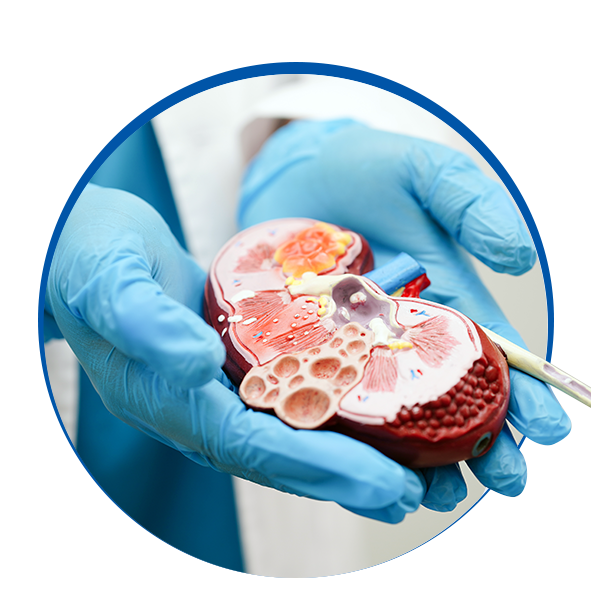Nephrology
Overview
Nephrology is a medical specialty that focuses on the diagnosis and treatment of kidney-related diseases and disorders. Nephrologists are physicians who specialize in this field and are trained to manage a wide range of kidney-related conditions, including acute and chronic kidney diseases, electrolyte imbalances, hypertension (high blood pressure) related to kidney issues, and kidney transplantation.

key Aspects of Nephrology
Kidney Function
The primary focus of nephrology is to understand the structure and function of the kidneys. Kidneys play a crucial role in filtering waste and excess substances from the blood, maintaining fluid and electrolyte balance, and regulating blood pressure.
Common Conditions
Nephrologists diagnose and treat various kidney-related conditions, such as chronic kidney disease (CKD), acute kidney injury (AKI), kidney stones, glomerulonephritis, polycystic kidney disease (PKD), and diabetic nephropathy, among others.

KIDNEY TRASPLANTATION
Evaluation and selection of suitable kidney donors and recipients. Pre-transplant assessments and compatibility testing. Living donor and deceased donor transplant procedures. Minimally invasive laparoscopic donor nephrectomy.

TRANSPLANT SURGERY AND CARE
Advanced surgical techniques for kidney transplantation. Robotic-assisted and laparoscopic procedures. Post-transplant monitoring and follow-up care.

RENAL TRANSPLANT EVALUTION AND WORKUP
Comprehensive medical and surgical evaluations for potential transplant candidates. Diagnostic testing, including blood work, imaging, and biopsies. Evaluation of transplant suitability and consideration of alternative treatments.
Common Nephrology Procedures
Hypertension Management
High blood pressure (hypertension) is a common cause of kidney damage.
Dialysis
When kidney function declines severely, patients may require renal replacement therapy, such as hemodialysis or peritoneal dialysis, to filter waste products and excess fluids from their blood.
Kidney Transplantation
Nephrologists work closely with transplant surgeons to evaluate and manage patients who are candidates for kidney transplantation.
Electrolyte and Acid-Base Disorders
Nephrologists are experts in diagnosing and treating electrolyte imbalances (e.g., sodium, potassium, calcium) and acid-base disorders (e.g., acidosis, alkalosis) that can result from kidney dysfunction.
Diagnostic Tools
Nephrologists use a variety of diagnostic tools, including blood tests, urine tests, imaging studies (such as ultrasound and CT scans), and kidney biopsies, to evaluate kidney function and identify the underlying causes of kidney disease.
Prevention and Education
Nephrologists also play a role in educating patients about kidney health and preventive measures. They may recommend lifestyle changes, diet modifications, and medication management to slow the progression of kidney disease or reduce the risk of kidney-related complications.
In summary, nephrology is a specialized medical field dedicated to the diagnosis, treatment, and management of kidney-related conditions. Nephrologists play a critical role in helping patients maintain kidney health, manage kidney diseases, and improve their overall quality of life.

